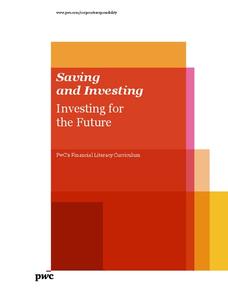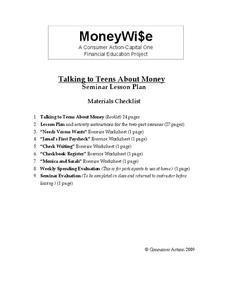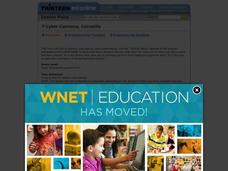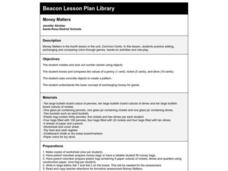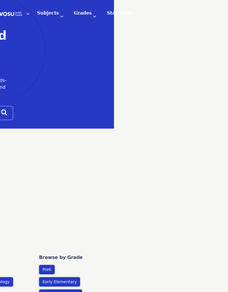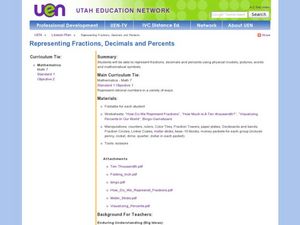PwC Financial Literacy
Saving and Investing: Investing for the Future
A fine lesson on saving and investing is here for you and your middle schoolers. In it, learners explore the values of time and money, and discover how small amounts of money invested over time can grow into a large "pot of gold." They...
Consumer Action
Talking to Teens About Money
Your teenagers are probably very good at spending money, but how good are they at managing it? Teach class members about banking, checking accounts, interest rates, car insurance, and many other relevant concepts with a series of...
Curated OER
Barter vs. Money
First graders listen to the book, Sheep in a Shop, that leads them to think about making financial decisions, trading, and the barter system. After the book is read aloud, a discussion ensues about some of the things that the sheep...
Practical Money Skills
Making Money
Prepare your class for a life of financial literacy and stability with a unit about making money. Three lessons guides learners through the process of preparing a resume, interviewing for a job, and reading a pay stub.
Curated OER
Comparing Values: Comparisons Between Musical Notation and Money
Students identify ways in which the principles and subject matter of other disciplines taught in school, specifically math, are interrelated with those of music.
Federal Reserve Bank
It's Your Paycheck
Beyond reading and arithmetic, one of the most important skills for graduating seniors to have is fiscal literacy and responsibility. Start them on the right financial track with nine lessons that focus on a variety of important...
PwC Financial Literacy
Planning and Money Management: Spending and Saving
Financial literacy is such an important, and often-overlooked, skill to teach our young people. Here is a terrific lesson which has pupils explore how to come up with a personal budget. They consider income, saving, taxes, and their...
Practical Money Skills
About Credit
It's tempting to stay away from credit cards entirely, and it can also be tempting to charge large purchases on credit cards with the intention to pay them off later. But as a three-part lesson on credit and debt shows your high...
Practical Money Skills
Living on Your Own
Every teen dreams of living independently, but often without thinking about the details and costs involved with moving out. Three lessons in a unit about living on your own focus on moving costs, fixed and flexible costs associated...
Curated OER
Who's On First?
Have you ever considered why the number 10 is so important to us? That's what learners do here. They explore patterns formed by powers of ten and by decimals, convert units of measure within the metric system, and express these in the...
Curated OER
Money Vocabulary
Explore the monetary system by completing worksheets in class. Learners will identify the monetary units of England and collaborate in groups to solve money word problems. They also identify several money-related vocabulary terms before...
Curated OER
Colonial Vacation Planner
Looking for a good lesson on the Colonial Period for your upper-elementary class? Then, this lesson is for you! They use website designs, U.S. travel publications, and maps to plan a family vacation to states which were part of the...
Practical Money Skills
Saving and Investing
You have to have money to make money, especially in the world of banking and investments. High schoolers learn about interest rates, saving and investment options, and ways to stay aware of their money's security and earning ability with...
Curated OER
The Role of Money
Fourth graders examine the role of money. In this money lesson, 4th graders read a chapter from Judy Blume's, Double Fudge, to see how money is made and how people make money. They finish a worksheet, and play a game about money.
Curated OER
Cyber Currency, Currently
Young scholars explore the value of currency and how to save and earn interest. In a key lesson, kids even get to purchase items in their classroom's general store. It's a fun way to learn the importance of being financially literate!
Curated OER
Money Matters
Students play a game called Money Matters using cut out representatives of pennies, nickels, and dimes.
Curated OER
Math Magic
Learners work in pairs, and take turns pretending to be a magician. There are a set of instructions for the magician to follow. A penny and a dime are used, and odd and even numbers are employed for multiplying. There is also a nifty...
Curated OER
Buying New Stuff
Young spenders take a look at the best ways to save and spend money. This type of financial education is lacking in schools, so implementing this lesson would be of great value to your students. Things like bank checking account fees,...
Curated OER
Money Matters
Students practice spending money by completing math word sentences. In this economics lesson, students utilize problem solving strategies to complete word problems written on the board involving making purchases with money....
Curated OER
Quarters and Dollars
Second graders determine value of quarters and dollars, solve real-life problems involving money, and compare values of sets of coins and bills.
PBS
What Is Money?
Early learners participate in a bartering activity during which they make connections to money and consumer concepts. They simulate buying and selling situations with one another then visit an exhibit at the Federal Reserve Bank of...
Practical Money Skills
Buying a Home
Guide high schoolers through the process of buying a house with a simulation lesson. As pupils learn about mortgages, renting versus buying, and home inspections, they discuss ways to make informed financial decisions and sound...
Curated OER
Representing Fractions, Decimals, and Percents
In this fractions, decimals, and percents lessons, students explore various methods of representing fractions. They demonstrate situations that represent rational numbers. Students create a foldable exploring fractions, decimals and...
Curated OER
Adding and Subtracting Money
Students investigate U.S. currency by pretending to buy food. In this money lesson, students discover the vocabulary and value for each U.S. coin, then add the amounts in dollars and cents of food items they wish to purchase....
